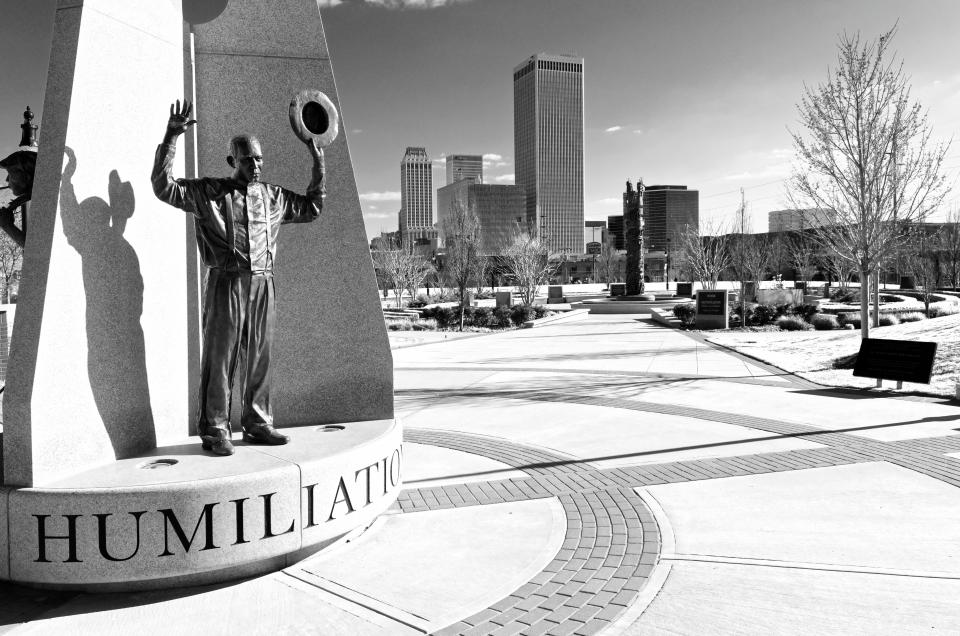
City Needs To Hold Hearings On Racial Bia
Addressing racial practices in police departments is never easy and will make for awkward interactions. However, if a law-maker doesn’t have the courage to do the difficult thing, what good are they? In this case, Tulsa City Counsilman Vanessa Hall-Harper plans to move ahead with public hearings on racial disparities identified in the 2018 Tulsa Equality Indicators report. Tulsa has problems, has had problems and continues to live with African Americans and law enforcement incidents that paints a picture of racial bias. The history is long and painful when one speaks of Tulsa Police Department and African Americans. This is now different because the concerns arose out of a scientific study. It will take courage and science to develop answers. Now is the time for gathering evidence and developing solutions to a major problem.
While some believe this is just an effort to drag out into the light the town bigots, in truth, this should be an examination of faulty police practices as they occur. One indication of police conditions can be found in their historic negative response to community policing. At one time Tulsa was a national leader in community policing. The Tulsa Police Chief at the time was Drew Diamond. He is still a national leader in the movement. He has authored Department of Justice papers on the status of community policing. In 1991, he was also given a no-confidence vote of 458-65 in large part because of his advocacy of community policing. Some on the force like the police union thought they were being turned into social workers and they wanted to return to their traditional roles. Unfortunately, those roles included excessive force, and other problems that were routinely racially biased.
Under President Barack Obama and his Attorney General Eric Holder, they started a new drive to strengthen Community-based policing after President George W. Bush worked to reduce the Community Oriented Police Services (COPS) program through less funding. Obama and Holder were behind it and worked to give it the support it needed, However, the political struggle between republican opposition to federal autonomy over local governments and democrat beliefs that the federal government had a proper role in local government especially when states and local government were offenders or unwilling to police law enforcement. Part of the reason Diamond resigned was because of constant harassment from two republican city councilmen who detested community policing. The lines have been drawn. Currently, Tulsa Mayor G.T. Bynum a man of progressive and measured thought is working to take another look at community policing. Of course, the city’s motivated in the wake of the data presented in the Tulsa Equality Indicators Annual Report 2018. Fifty community leaders signed a letter demanding action on a report that showed in real numbers the disparity of aggressive police actions and people of color. Hall-Harper is tired of waiting and has plans to hold public hearings. The results will no doubt paint another picture of a racially biased system when it comes to law enforcement and African Americans.
High profile police shootings have exposed deep divisions between the community and law enforcement. In truth, and the Equity report bears this out, African Americans are more likely to be pulled over and receive violent treatment. In recent years places like Ferguson, Mo., show police bias runs even deeper in some communities. Because places like Ferguson could not be trusted to monitor themselves, loss of federal oversight will as most reports on community policing will tell you racial bias will return.
Unfortunately, anyone expecting any help from the Department of Justice and their ability to implement consent decrees which develops oversight over police department policies and actions will be disappointed. In his last days as the United States Attorney General, Jeff Sessions all but eliminated federal community policing programs and made consent decrees toothless and of little consequence. Consent decrees have proven to be effective in improving police practices in places where brutal police tactics toward African Americans was the norm. Under the decree there were new programs and policies designed to improve police relations with the community. This included hiring and diversification. Tulsa has an ambitious program and on paper is working to increase their communication in the community to build trust and reduce police and citizen violence. As part of the new strategies Tulsa Police Department would participate in the program that evaluates police department community policing efforts. Jeff Sessions discontinued that program before he resigned. Sessions favors and all out assault on violent crime. Like other war on crimes many feel its more like a war on people of color and or the poor. That has always been the republican approach to fighting crime. Democrats in their effort to engage the community have been accused of being soft on crime or anti-police. The eternal struggle of political differences has never been so divided.
Despite the struggle for positive change and its uphill nature, Hall-Harper is forging ahead to examine police tactics. She will no doubt receive opposition based on old opinions from city attorney David O’Meilia and the Ethics Advisory Committee that allege she has a conflict of interest because her husband is a policeman. If the data collected proves to be negative against the police department, hard to see how, she would benefit from her participation in holding the hearings. There doesn’t appear to be a consensus on the council as to whether there is a need to hold hearings. Some may say they are updated often. Of course, that isn’t what a public hearing will collect. It will be the voices of the people. That is the most important information to be considered.
Citizens maybe more to blame than overzealous cops by some theories. Why are there brutal and insensitive cops? In truth, most cops are thoughtful peace officers who are working hard to protect and serve the public. Perhaps from a primal place, many citizens want the brute to be on the street ready to confront the violent nature of criminals. To meet evil with the steel rod of justice. In the aftermath of 9/11 there was support for letting cops do what they must to protect the public from harm. If that meant turning the other way while the police dealt with criminals who might commit horrible crimes, then so be it. Problem is, hiring policemen with violent natures and low impulse control can end up in physical confrontations with the public.
Tulsa police officers must have a bachelor’s degree and it was hoped a more educated officer would make better decisions. However, the nature of the job is stressful, and trust is still an issue. From a sociological perspective anyone placed in a stressful and racially charged environment are likely to change in ways that goes against their core nature. Despite the complicated backdrop and history of improving police tactics the holding of public hearings is still needed.









